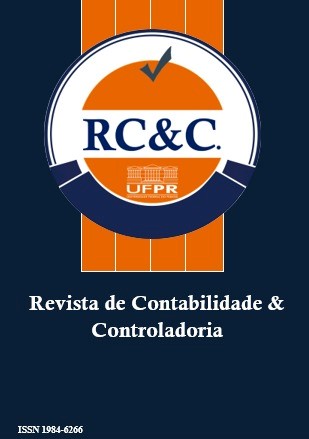Analysis of Studies on Performance Measurement Systems in Business, Management and Accounting Area
DOI:
https://doi.org/10.5380/rcc.v16i2.89877Keywords:
Bibliometrics, Performance measurement systems, PMS, Scopus.Abstract
This study aimed to analyze the scientific production on performance measurement systems, one of the central themes in the literature referring to management control systems. Considering the importance of this theme for the business, management and accounting area, a bibliometric analysis of publications indexed in Scopus referring to this category was carried out, covering the period from 1990 to 2021, and operationalized with the aid of RStudio's Biblioshiny software. The selection of articles in the Scopus database was carried out by searching for the keyword “performance measurement system” in the title, abstract and keyword fields. Only articles in English published in journals were considered. After the filtering process, the final sample comprised 1,040 scientific articles. The main results indicate a representative growth of publications from the 2000s onwards, with the Balanced Scorecard being one of the central themes in the literature on performance measurement systems. It was also found that the most relevant authors are from the United Kingdom, both in the number of publications and in the number of citations. As a contribution, this study serves as a starting point for academics and researchers interested in delving deeper into the literature on performance measurement systems, thus stimulating the production of new work that can strengthen the understanding of this subject.
References
Aria, M., & Cuccurullo, C. (2017). bibliometrix: An R-tool for comprehensive science mapping analysis. Journal of Informetrics, 11(4), 959-975. doi:10.1016/j.joi.2017.08.007.
Baas, J., Schotten, M., Plume, A., Côté, G., & Karimi, R. (2020). Scopus as a curated, high-quality bibliometric data source for academic research in quantitative science studies. Quantitative Science Studies, 1(1), 377-386. doi:10.1162/qss_a_00019.
Bititci, U. S. (1995). Modelling of performance measurement systems in manufacturing enterprises. International Journal of Production Economics, 42(2), 137-147. doi:10.1016/0925-5273(95)00172-7.
Bititci, U. S., Carrie, A. S., & McDevitt, L. (1997). Integrated performance measurement systems: a development guide. International Journal of Operations & Production Management, 17(5), 522-534. doi:10.1108/01443579710167230.
Bititci, U. S., Turner, U., & Begemann, C. (2000). Dynamics of performance measurement systems. International Journal of Operations & Production Management, 20(6), 692-704. doi:10.1108/01443570010321676.
Bititci, U. S., Mendibil, K., Nudurupati, S., Turner, T., & Garengo, P. (2004). The interplay between performance measurement, organizational culture and management styles. Measuring Business Excellence, 8(3), 28-41. doi:10.1108/13683040410555591.
Bititci, U. S., Mendibil, K., Nudurupati, S., Garengo, P., & Turner, T. (2006). Dynamics of performance measurement and organisational culture. International Journal of Operations & Production Management, 26(12), 1325-1350. doi:10.1108/01443570610710579.
Bourne, M., Mills, J., Neely, A., Platts, K., Wilcox, M., Hamblin, D., & Bicheno, J. (1999). Performance measurement system design: testing a process approach in manufacturing companies. International Journal of Business Performance Management, 1(2), 154-170. doi:1504/IJBPM.1999.004435.
Bourne, M., Mills, J., Wilcox, M., Neely, A., & Platts, K. (2000). Designing, implementing and updating performance measurement systems. International Journal of Operations & Production Management, 20(7), 754-771. doi:10.1108/01443570010330739.
Bourne, M., Neely, A., Platts, K., & Mills, J. (2002). The success and failure of performance measurement initiatives: Perceptions of participating managers. International Journal of Operations & Production Management, 22(11), 1288-1310. doi:10.1108/01443570210450329.
Bourne, M., Neely, A., Mills, J., & Platts, K. (2003). Implementing performance measurement systems: a literature review. International Journal of Business Performance Management, 5(1), 1-24. doi:10.1504/IJBPM.2003.002097.
Bourne, M. (2005). Researching performance measurement system implementation: the dynamics of success and failure. Production Planning & Control, 16(2), 101-113. doi:10.1080/09537280512331333011.
Brignall, S., & Modell, S. (2000). An institutional perspective on performance measurement and management in the ‘new public sector’. Management Accounting Research, 11(3), 281-306. doi:10.1006/mare.2000.0136.
Chenhall, R. H. (2005). Integrative strategic performance measurement systems, strategic alignment of manufacturing, learning and strategic outcomes: an exploratory study. Accounting, Organizations and Society, 30(5), 395-422. doi:10.1016/j.aos.2004.08.001.
Choong, K. K. (2013). Understanding the features of performance measurement system: a literature review. Measuring Business Excellence, 17(4), 102-121. doi:10.1108/MBE-05-2012-0031.
Cranfield University (s.d.). Cranfield University – Professor Michael Bourne. Recuperado em 26 agosto, 2022, de: https://www.cranfield.ac.uk/som/people/professor-michael-bourne-334715
Cross, K. F., & Lynch, R. L. (1988). The “SMART” way to define and sustain success. National Productivity Review, 8(1), 23-33. doi:10.1002/npr.4040080105.
Crawford, K. M., & Cox, J. F. (1990). Designing performance measurement systems for just-in-time operations. The International Journal of Production Research, 28(11), 2025-2036. doi:10.1080/00207549008942850.
Davies, M., & Shellard, E. (1997). The value of performance measurement in the United Kingdom. The Journal of Government Financial Management, 46(3), 48-51. Recuperado em 25 agosto, 2022, de: https://www.proquest.com/openview/dd5319b7f10307ffe5be70af65187b0a/1?pq-origsite=gscholar&cbl=26015
Deng, F; Smyth, HJ; Anvuur, AM; (2012) A critical review of PMS in construction: towards a research agenda. In: Smith, SD, (ed.) Proceedings of the 28th ARCOM Conference, Edingburgh, September 2012. (pp. 807 - 816). Association of Researchers in Construction Management: Reading, UK. Recuperado em 25 agosto, 2022, de: https://discovery.ucl.ac.uk/id/eprint/1358228
Dobija, D., Górska, A. M., Grossi, G., & Strzelczyk, W. (2019). Rational and symbolic uses of performance measurement: Experiences from Polish universities. Accounting, Auditing & Accountability Journal, 32(3), 750-781. doi:10.1108/AAAJ-08-2017-3106.
Donthu, N., Kumar, S., Mukherjee, D., Pandey, N., & Lim, W. M. (2021). How to conduct a bibliometric analysis: An overview and guidelines. Journal of Business Research, 133, 285-296. doi:10.1016/j.jbusres.2021.04.070.
Eccles, R. G. (1991). The performance measurement manifesto. Harvard Business Review, 69(1), 131-137. Recuperado em 15 julho, 2022, de: https://hbr.org/1991/01/the-performance-measurement-manifesto
Elango, B., & Rajendran, P. (2012). Authorship trends and collaboration pattern in the marine sciences literature: a scientometric study. International Journal of Information Dissemination and Technology, 2(3), 166-169. Recuperado em 16 julho, 2022, de: https://www.indianjournals.com/ijor.aspx?target=ijor:ijidt&volume=2&issue=3&article=003
Frederico, G. F., Garza-Reyes, J. A., Kumar, A., & Kumar, V. (2021). Performance measurement for supply chains in the Industry 4.0 era: a balanced scorecard approach. International Journal of Productivity and Performance Management, 70(4), 789-807. doi:10.1108/IJPPM-08-2019-0400.
Garengo, P., Biazzo, S., & Bititci, U. S. (2005). Performance measurement systems in SMEs: A review for a research agenda. International Journal of Management Reviews, 7(1), 25-47. doi:10.1111/j.1468-2370.2005.00105.x.
Guarini, E., Magli, F., & Francesconi, A. (2020). Academic logics in changing performance measurement systems: an exploration in a university setting. Qualitative Research in Accounting & Management, 17(1), 109-142. doi:10.1108/QRAM-06-2019-0076.
Harvard Business Review (s.d.). Harvard Business Review – Ideas and Advices for Leaders. Recuperado em 15 julho, 2022, de: https://www.hbr.org
Henri, J. F. (2006). Management control systems and strategy: A resource-based perspective. Accounting, Organizations and Society, 31(6), 529-558. doi:10.1016/j.aos.2005.07.001.
Heriot-Watt University (s.d.). Heriot-Watt University – Professor Umit Bititci. Recuperado em 26 agosto, 2022, de: https://www.hw.ac.uk/ebs/people/faculty/umit-bititci.htm
Hervani, A. A., Helms, M. M., & Sarkis, J. (2005). Performance measurement for green supply chain management. Benchmarking: An International Journal, 12(4), 330-353. doi:10.1108/14635770510609015.
International Journal of Operations & Production Management (s.d.). International Journal of Operations & Production Management. Resgatado em 15 julho, 2022, de: https://www.emeraldgrouppublishing.com/journal/ijopm.
International Journal of Productivity and Performance Management (s.d.). International Journal of Productivity and Performance Management. Recuperado em 15 julho, 2022, de: https://www.emeraldgrouppublishing.com/journal/ijppm.
Jardioui, M., Garengo, P., & El Alami, S. (2019). How organizational culture influences performance measurement systems in SMEs. International Journal of Productivity and Performance Management, 69(2), 217-235. doi:10.1108/IJPPM-10-2018-0363.
Julnes, P. D. L., & Holzer, M. (2001). Promoting the utilization of performance measures in public organizations: An empirical study of factors affecting adoption and implementation. Public Administration Review, 61(6), 693-708. doi:10.1111/0033-3352.00140.
Kamble, S. S., Gunasekaran, A., Ghadge, A., & Raut, R. (2020). A performance measurement system for industry 4.0 enabled smart manufacturing system in SMMEs-A review and empirical investigation. International journal of production economics, 229, 107853. doi:10.1016/j.ijpe.2020.107853.
Kanji, G. K. (2002). Performance measurement system. Total Quality Management, 13(5), 715-728. doi:10.1080/0954412022000002090.
Kaplan, R. S., & Norton, D. P. (1992). The balanced scorecard: measures that drive performance. Harvard Business Review, 70(1), 71–79. Resgatado em 10 de julho de 2022, em https://hbr.org/1992/01/the-balanced-scorecard-measures-that-drive-performance-2.
Kennerley, M., & Neely, A. (2003). Measuring performance in a changing business environment. International Journal of Operations & Production Management, 23(2), 213-229. doi:10.1108/01443570310458465.
Kumar, S., Pandey, N., Lim, W. M., Chatterjee, A. N., & Pandey, N. (2021). What do we know about transfer pricing? Insights from bibliometric analysis. Journal of Business Research, 134, 275-287. doi:10.1016/j.jbusres.2021.05.041.
Management Accounting Research (s.d.). Management Accounting Research – Journal - Elsevier. Recuperado em 15 julho, 2022, de: https://www.emeraldgrouppublishing.com/journal/mbe
Measuring Business Excellence (s.d.). Measuring Business Excellence. Recuperado em 15 julho, 2022, de: https://www.emeraldgrouppublishing.com/journal/mbe
Miller, D., Le Breton‐Miller, I., & Scholnick, B. (2008). Stewardship vs. stagnation: An empirical comparison of small family and non‐family businesses. Journal of management studies, 45(1), 51-78. doi:10.1111/j.1467-6486.2007.00718.x.
Nasiri, M., Ukko, J., Saunila, M., Rantala, T., & Rantanen, H. (2020). Digital-related capabilities and financial performance: the mediating effect of performance measurement systems. Technology Analysis & Strategic Management, 32(12), 1393-1406. doi:10.1080/09537325.2020.1772966.
Neely, A., Gregory, M., & Platts, K. (1995), "Performance measurement system design: A literature review and research agenda", International Journal of Operations & Production Management, 15(4), 80-116. doi:10.1108/01443579510083622.
Neely, A., & Bourne, M. (2000). Why measurement initiatives fail. Measuring Business Excellence, 4(4), 3-7. doi:10.1108/13683040010362283.
Nudurupati, S. S., Bititci, U. S., Kumar, V., & Chan, F. T. (2011). State of the art literature review on performance measurement. Computers & Industrial Engineering, 60(2), 279-290. doi:10.1016/j.cie.2010.11.010.
Pinheiro de Lima, E., Gouvêa da Costa, S. E., & Angelis, J. J. (2008). The strategic management of operations system performance. International Journal of Business Performance Management, 10(1), 108-132. doi:10.1504/IJBPM.2008.015924.
Pinheiro de Lima, E., Gouvêa da Costa, S. E., Angelis, J. J., & Munik, J. (2013). Performance measurement systems: A consensual analysis of their roles. International Journal of Production Economics, 146(2), 524-542. doi:10.1016/j.ijpe.2012.05.007.
Sabri, E. H., & Beamon, B. M. (2000). A multi-objective approach to simultaneous strategic and operational planning in supply chain design. Omega – The International Journal of Management Science, 28(5), 581-598. doi:10.1016/S0305-0483(99)00080-8.
Tatikonda, M. V., & Montoya-Weiss, M. M. (2001). Integrating operations and marketing perspectives of product innovation: The influence of organizational process factors and capabilities on development performance. Management Science, 47(1), 151-172. doi:10.1287/mnsc.47.1.151.10669.
Väisänen, M., Tessier, S., & Järvinen, J. T. (2021). Fostering enabling perceptions of management controls during post‐acquisition integration. Contemporary Accounting Research, 38(2), 1341-1367. doi:10.1111/1911-3846.12639.
Zupic, I., & Čater, T. (2015). Bibliometric methods in management and organization. Organizational Research Methods, 18(3), 429-472. doi: 10.1177/1094428114562629. doi: 10.1177/1094428114562629.
Downloads
Published
How to Cite
Issue
Section
License
Copyright (c) 2024 Revista Contabilidade e Controladoria - RC&C

This work is licensed under a Creative Commons Attribution-NonCommercial-NoDerivatives 4.0 International License.
The works published in RC&C. Journal of Accounting and Management Control are subject to the following terms:
1.1. RC&C. Journal of Accounting and Management Control, through the Graduate Program in Accounting of the Department of Accounting – Sector of Applied Social Sciences – Federal University of Paraná, retains the ownership rights (copyright) of the published works and encourages and allows their reuse under the Creative Commons Attribution-NonCommercial-ShareAlike 4.0 International License (CC BY-NC-SA 4.0), so that they may be copied, used, disseminated, transmitted, and publicly displayed, provided that:
1.1.a. The authorship and original source of publication (journal, publisher, URL, and article DOI) are properly cited.
1.1.b. They are not used for commercial or profit-making purposes.
1.1.c. The existence and specifications of this license are mentioned.
1.2. Each article published will be assigned a Digital Object Identifier (DOI).









